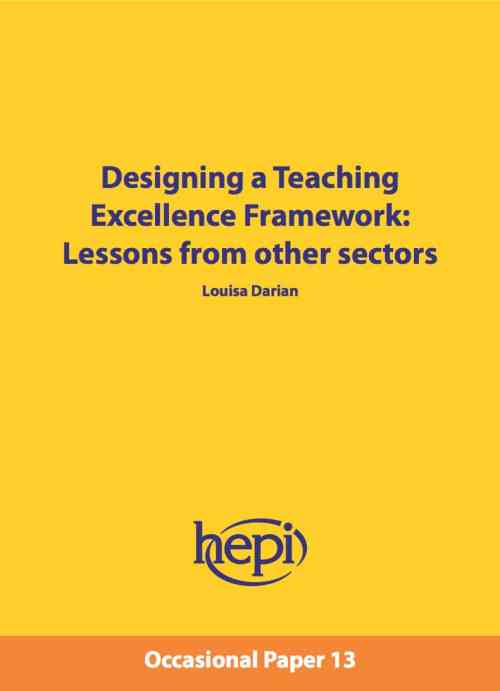On Thursday, 25th February 2016, the Higher Education Policy Institute (HEPI) publishes Designing a Teaching Excellence Framework: Lessons from other sectors, a paper exploring the experience of ratings in other education and care markets, calling on the Government to heed the lessons from them in developing the Teaching Excellence Framework (TEF).
The report’s author, Louisa Darian, who led the work on higher education at Which?, said:
‘A well-designed TEF has an important role to play in supporting students to make informed choices. In order to do so, institutions will need to apply for higher-level awards, and ratings will need to be based on rich evidence and available at subject-level.
‘While moving to an Ofsted-style scheme would be difficult in higher education, Government and the sector should consider how to further integrate the TEF into the quality assurance system. The Government should also postpone the first year of the TEF to ensure that it delivers meaningful information to students.’
Nick Hillman, HEPI’s Director, said:
‘Ministers want to see the best possible teaching and learning in higher education. But assessing the quality is easier said than done. There is no agreed way of assessing what students learn. There is no off-the-shelf solution available from another country. And there will be perverse consequences if we get it wrong.
‘But we can learn from experience in other sectors. Ratings have existed for many years for nurseries, schools and hospitals. These provide positive and negative lessons for the new TEF. If we consider them closely, we can find out how to ensure the TEF does not become too big, too bossy or too bureaucratic – and that it hits the right target.’
The report examines Ofsted’s relative success, where ratings have expanded from schools to the wider education market, and compares it to the more intermittent history of ratings in health and social care. It concludes that the following will be important, but also a challenge, for the TEF.
- Stability in the organisation delivering the ratings: Instability in the organisations delivering ratings presents challenges for regulators, providers and consumers alike. It will pose a challenge for the TEF, which comes alongside significant changes to the regulatory landscape.
- The use of a wide range of evidence, including good outcomes data and visits: In other markets regulators draw on a wide range of data, in addition to good outcomes data. The lack of good outcomes data in higher education will make wider sources more important, but will also prove more difficult in the absence of a visit.
- The role of experts in developing ratings: There has been an increasing emphasis on involving experts and practitioners in delivering ratings. While the TEF will draw on the expert views of a panel, this expertise could become diluted with the possible move to subject-level ratings.
- Disaggregation, and comprehensive coverage, of ratings: In order to support choice ratings have covered all providers, and have been made available at more granular levels – for example, at the level of a hospital department. Subject-level ratings will be important for the TEF.
- Inclusion of ratings in league tables and alongside a wider set of data: Ratings often sit alongside wider comparable information, and their inclusion in league tables has been important. The TEF will need to be sufficiently weighted against other league table variables, such as degree outcomes and research excellence. Reform to the Key Information Set (KIS) must also take priority.
The report identifies two points for the Government and sector to consider:
- Firstly, the need for the TEF to be more deeply integrated with the quality assurance, and external examining, system. This will help minimise burden, and support the collection of a richer set of evidence at subject-level.
- Secondly, for the TEF to be postponed to allow the findings from the technical consultation to feed into it. This would also allow sufficient time to consider how the TEF will fit with the quality assurance, and wider regulatory, system.
Ends
For further information please contact: Nick Hillman, HEPI Director at [email protected].
Notes for Editors
The Higher Education Policy Institute’s mission is to ensure that higher education policy-making is better informed by evidence and research. We are UK-wide, independent and non-partisan.

